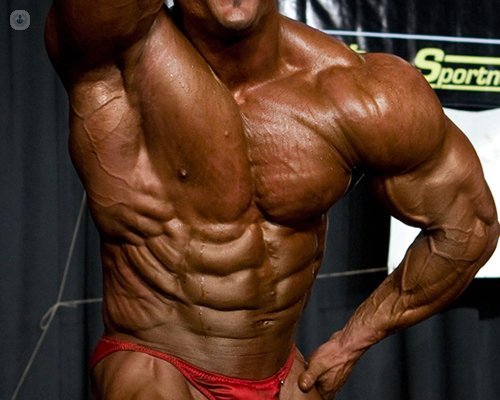What causes vigorexia dysmorphic disorder?
Written by:With unusual frequency psychiatrists serve patients who suffer believe this or that disease (cancer, infections, etc.) that do not actually suffer. They are called hypochondriacs. Some are absolutely convinced, others doubt about the veracity of his illness and others simply fear, knowing that their fear is unfounded. Still, they are unable to stop thinking that perhaps are sick.
Another group of patients, less common, are particularly ugly, repulsive or deformed believe, when in fact they are entirely normal. And remiran look in the mirror and what they see whenever they like less.
Dysmorphic patients, who are they?
Dysmorphic patients look bad and, what is worse, believe that others see them bad, so bad they call their attention and can not help but watch and even make stealthy comments about his unfortunate appearance.
Obviously, not to be seen are tempted to isolate themselves at home or when they leave home, to use a clothing to hide their shortcomings.
In some patients with dysmorphic disorder concern focuses on the face; It is the part of the body that makes us unique, through which we recognize and communicate and usually more look.
Dysmorphic patients often see his face outrageously asymmetrical, some, or disproportionate noses, others. Some patients with BDD feel that their skin is not normal, but rough, dry, greasy or overly populated by grains. Another group of dysmorphic patients, men and more common in Asian countries, are too self-conscious about having a small penis.
Particularly important group of patients (mostly women) who are abnormally fat; You can alter their overall body schema although, most often, alteration tends to focus on thighs and abdomen.
Gravity of their situation, as they perceive it , is such that solve your problem becomes a real obsession. If your labor, academic, family or social life suffers not only because of shame leads them to isolate themselves but because they do not sink into depression, concentrated all his energies exclusively on solving the problem.
Obviously, the way to wage his private battle against failing differ in each case depending on the imperfection. Consultations are pilgrims by plastic surgeons, looking for anyone willing to correct their deformity in the operating room. Others turn to various creams and potions (with the risk of being able to finish inflicting real damage auto). The convinced despite what say the tilting of being obese, mostly women, embark on fasting and extreme diets and physical hyperactivity in order to lose weight. Anorexia nervosa is a potentially lethal disease.

Dysmorphic patients: vigorexia
A recently incorporated into the repertoire of psychiatric diagnoses pathology is a variant of dysmorphic disorder in which the patient perceived deformity refers to his muscle mass. The vigoréxicos are, and believed to be seen as weaklings and weaklings abnormally. They aspire to have more muscle.
The vigoréxicos share with anorexias fatty tissue rejection (not want to be neither fat nor mushy) but otherwise seems speculate vigorexia anorexia image, just the opposite.
The vigoréxicos fight their battle to improve the physical appearance on three fronts:
- the gym. The vigoréxico competes with himself in the mirror, surrounded by weights, pulleys and ingenious devices, with which, millimeter by millimeter, aims to increase every muscle. Unlike anorexics, the exercise of vigoréxicos burn calories but does not seek to sculpt the body.
- Anabolic drugs, with major medical and psychiatric side effects. Anorexics, meanwhile, resort to diuretics and laxatives.
- Diet. The vigoréxicos consume large amounts of protein, gobbling chickens or buying powdered shakes and specialty stores, in amounts that exceed the recommended length for an athlete. Anorexics, on the contrary, just eat and, when they do often expel. They prefer vegetable fiber.
Although the cause of psychiatric disorders is always complex and only partially known, it is reasonable to suspect that the overwhelming importance that is given muscle or its lack somewhat related to machismo and the role attributed to the man in the macho tradition.
Vigorexia, in many cases, it is associated with sexual promiscuity, violent behavior and the risk to the performance of work activities related to potential intimidation and use of force, contempt towards homosexuals ...
Historically, the exaltation of virility has valued qualities as strength, corpulence, the courage, agility, courage and combativeness. However, neither history nor anthropology seem to offer no comparable example of exaltation of the musculature. He could be assessed force as something useful for combat or for farm work, or even to win contests lifting stones, but not the muscularity as an end in itself, worthy of being enjoyed in the mirror or displayed in contests.
What attribute for this batch of Hulks always eager to follow hypertrophying your muscles? It does not seem unreasonable to think that several film heroes of all known, with enormous musculature and always ready to defend the weakest - and las- and his country, have played a significant role -even without being solely responsible, much less , in model mentalities of the new disorder arises.



